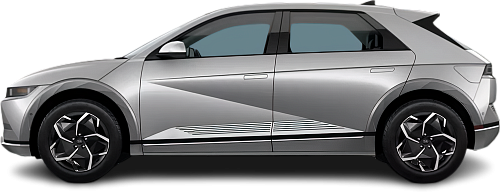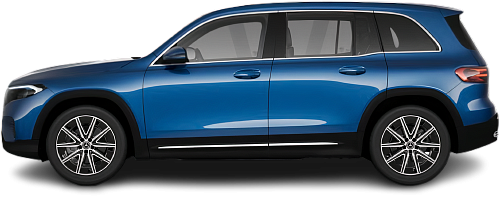Global EV Comparison: Hyundai Ioniq 5 Standard Range AWD vs Mercedes EQB 350 4MATIC
Struggling to Decide? Let AI Help!
Your AI Summary Is Ready!
General Info
The Mercedes EQB 350 4MATIC (2023-…) is currently produced, it has a starting price of €58197. The Hyundai Ioniq 5 Standard Range AWD (2021-2022) has been discontinued. You can find it for as low as €33900 on the used car market.
The two vehicles share the same body style: SUV.
| Property | Hyundai Ioniq 5 Standard Range AWD | Mercedes EQB 350 4MATIC |
|---|---|---|
| Years of Production | 2021-2022 | 2023-… |
| Current Status | Discontinued | Produced |
| Country of Manufacture | Indonesia, Singapore, South Korea | Hungary |
| Body Style | SUV | SUV |
| Market Availability | EU | EU, USA |
| Price Europe (New) | - Price Europe (New) | €58197 |
| Price Europe (Used) | €33900 | €37990 |
| GCC Score | 6.4 | 6.2 |
Range and Efficiency
While the Mercedes EQB 350 4MATIC (2023-…) offers a longer real-world range and a bigger battery, it is less energy-efficient than the Hyundai Ioniq 5 Standard Range AWD (2021-2022).
| Property | Hyundai Ioniq 5 Standard Range AWD | Mercedes EQB 350 4MATIC |
|---|---|---|
| Range (EPA) | - Range (EPA) | 333 km |
| Range (WLTP) | 362 km | 448 km |
| Range (GCC) | 308 km | 351 km |
| Battery Capacity (Nominal) | 58 kWh | 69.7 kWh |
| Battery Capacity (Usable) | 54 kWh | 66.5 kWh |
| Efficiency per 100 km | 17.5 kWh/100 km | 18.9 kWh/100 km |
| Efficiency per kWh | 5.7 km/kWh | 5.28 km/kWh |
| Range and Efficiency Score | 5.8 | 5.9 |
Charging
The Hyundai Ioniq 5 Standard Range AWD (2021-2022) features an advanced 800-volt architecture, whereas the Mercedes EQB 350 4MATIC (2023-…) relies on a standard 400-volt system.
The Hyundai Ioniq 5 Standard Range AWD (2021-2022) offers faster charging speeds at DC stations, reaching up to 175 kW, while the Mercedes EQB 350 4MATIC (2023-…) maxes out at 100 kW.
Both vehicles are equipped with the same on-board charger, supporting a maximum AC charging power of 11 kW.
| Property | Hyundai Ioniq 5 Standard Range AWD | Mercedes EQB 350 4MATIC |
|---|---|---|
| Max Charging Power (AC) | 11 kW | 11 kW |
| Max Charging Power (DC) | 175 kW | 100 kW |
| Architecture | 800 V | 400 V |
| Charge Port | CCS Type 2 | CCS Type 2 |
| Charging Score | 6.9 | 5.4 |
Performance
Both vehicles are all-wheel drive.
Although the Mercedes EQB 350 4MATIC (2023-…) has more power, the Hyundai Ioniq 5 Standard Range AWD (2021-2022) achieves a faster 0-100 km/h time.
| Property | Hyundai Ioniq 5 Standard Range AWD | Mercedes EQB 350 4MATIC |
|---|---|---|
| Drive Type | AWD | AWD |
| Motor Type | PMSM (front), PMSM (rear) | IM (front), PMSM (rear) |
| Motor Power (kW) | 173 kW | 215 kW |
| Motor Power (hp) | 232 hp | 288 hp |
| Motor Torque | 605 Nm | 520 Nm |
| 0-100 km/h | 6.1 s | 6.2 s |
| Top Speed | 185 km/h | 160 km/h |
| Performance Score | 4.8 | 4.5 |
Dimensions
The Hyundai Ioniq 5 Standard Range AWD (2021-2022) has a wider body, offering a more shoulder room, while the Mercedes EQB 350 4MATIC (2023-…) stands taller for a more elevated driving position. Despite these differences, their lengths are nearly identical.
The Hyundai Ioniq 5 Standard Range AWD (2021-2022) boasts a more extended wheelbase.
| Property | Hyundai Ioniq 5 Standard Range AWD | Mercedes EQB 350 4MATIC |
|---|---|---|
| Length | 4635 mm | 4684 mm |
| Width (with Mirrors) | 2152 mm | 2020 mm |
| Width (w/o Mirrors) | 1890 mm | 1834 mm |
| Height | 1605 mm | 1667 mm |
| Wheelbase | 3000 mm | 2829 mm |
Cargo and Towing
The Hyundai Ioniq 5 Standard Range AWD (2021-2022) features a larger trunk, but the Mercedes EQB 350 4MATIC (2023-…) offers greater maximum cargo capacity when the rear seats are folded.
A frunk (front trunk) is available in the Hyundai Ioniq 5 Standard Range AWD (2021-2022), but the Mercedes EQB 350 4MATIC (2023-…) doesn’t have one.
The Mercedes EQB 350 4MATIC (2023-…) has a towing capacity of up to 1700 kg, whereas the Hyundai Ioniq 5 Standard Range AWD (2021-2022) is not officially rated for towing in the EU.
| Property | Hyundai Ioniq 5 Standard Range AWD | Mercedes EQB 350 4MATIC |
|---|---|---|
| Number of Seats | 5 | 5, 7 |
| Curb Weight | 2015 kg | 2165 kg |
| Cargo Volume (Trunk) | 531 l | 495 l |
| Cargo Volume (Max) | 1591 l | 1710 l |
| Cargo Volume (Frunk) | 24 l | - Cargo Volume (Frunk) |
| Towing Capacity | - Towing Capacity | 1700 kg |
| Cargo and Towing Score | 6.6 | 7.4 |




